Phalangium opilio
| Phalangium opilio | |
|---|---|
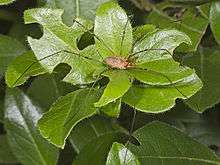 | |
| Male Phalangium opilio | |
| Scientific classification | |
| Kingdom: | Animalia |
| Phylum: | Arthropoda |
| Class: | Arachnida |
| Order: | Opiliones |
| Family: | Phalangiidae |
| Genus: | Phalangium |
| Species: | P. opilio |
| Binomial name | |
| Phalangium opilio Linnaeus, 1758 | |
Phalangium opilio is "the most widespread species of harvestman in the world", occurring natively in Europe, and much of Asia, and having been introduced to North America, North Africa and New Zealand.[1] It is found in a wide range of habitats, including meadows, bogs, forests, and various types of anthropogenic habitats, such as gardens, fields, hedgerows, lawns, quarries, green places in built-up areas, walls and bridges.[1]
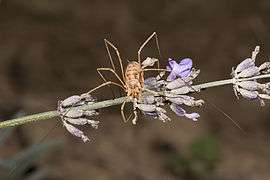 female
female- male with Trombidium sp.
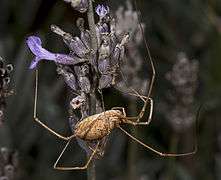 female side view
female side view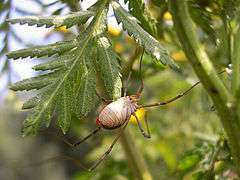 female bottom with a Trombidiformes mite
female bottom with a Trombidiformes mite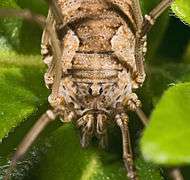 female
female
References
- 1 2 Tone Novak, Vesna Klokočovnik, Saša Lip ovšek Delakorda, Dušan Devetak & Franc Janželpvoč (2009). "Preferences for different substrates in Phalangium opilio (Opiliones: Phalangiidae) in natural environment" (PDF). Acta Biologica Slovenica. 52 (1): 29–35.
| Wikimedia Commons has media related to Phalangium opilio. |
This article is issued from Wikipedia - version of the 8/4/2016. The text is available under the Creative Commons Attribution/Share Alike but additional terms may apply for the media files.